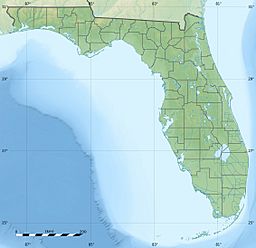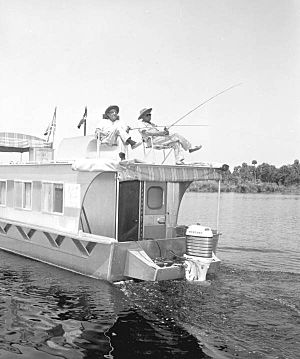Orange Lake (Florida) facts for kids
Quick facts for kids Orange Lake |
|
|---|---|
| Location | Alachua County, Florida |
| Coordinates | 29°27′54″N 82°10′39″W / 29.46500°N 82.17750°W |
| Type | lake |
| Surface area | 12,550 acres (5,080 ha) |
Orange Lake is a large lake located in Alachua County, Florida. It's about 10 miles (16 km) south of a town called Hawthorne. This lake is a popular spot for fishing, especially for bass. Many fishing camps are set up along its shores.
Contents
Discovering Orange Lake
Orange Lake covers a huge area, about 12,550 acres (5,080 ha). That's like more than 9,500 football fields! It's part of a bigger system called the Orange Creek Basin. This basin then connects to the Ocklawaha River watershed. A watershed is an area of land where all the water drains into one main river or lake.
How Water Flows In and Out
Water flows into Orange Lake from Lochloosa Lake through a waterway called Cross Creek. The lake also gets water from Newnans Lake. This water used to flow into Paynes Prairie, but now it's directed towards Orange Lake.
After filling Orange Lake, the water then flows out through Orange Creek. This creek carries the water into the Rodman Reservoir. So, Orange Lake is like a busy stop in a long water journey!
Nature and Wildlife
Orange Lake is famous for its excellent fishing. It's a favorite place for catching bass. Besides fish, the lake is home to many interesting natural features.
One unique thing about Orange Lake is its many natural floating islands. These islands actually float on the water! Scientists have found that these floating islands have a really wide variety of plants and animals. They are especially important for different kinds of amphibians, like frogs and salamanders.
A Glimpse into History
Orange Lake has a long history, even before Florida became a state.
Ancient Villages and Explorers
Back in 1539, a Native American village called Potano was located right along the western shore of Orange Lake. This was when the famous Spanish explorer Hernando de Soto and his expedition visited the area.
Later, in 1584, the town of Potano was moved. It was relocated northwest of what is now Gainesville, Florida, after being burned by the Spanish.
Spanish Missions and Discoveries
By 1608, a Spanish Mission named San Buenaventura de Potano was built at the original site of the Potano village. Missions were like churches and settlements built by the Spanish to teach Native Americans about their religion.
In 2013, archaeologists made an exciting discovery. They found the remains of the old Potano town and the foundation of the mission church. This site is known as the Richardson Site, or 8AL100. These findings help us learn more about the people who lived around Orange Lake centuries ago.
How Orange Lake Got Its Name
The lake got its name because it was located in an area where many citrus fruits, especially oranges, were grown. It was a big citrus-growing district, so naming the lake "Orange Lake" made perfect sense!
 | Chris Smalls |
 | Fred Hampton |
 | Ralph Abernathy |



